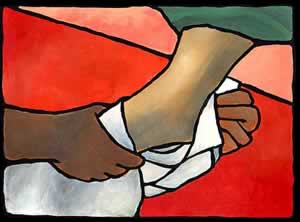 Earlier than I would have preferred this morning, in order to scurry home and shuffle my son off to day camp, I took a sweaty summer walk with a friend. As our heart rates rose, we chatted about the conversation happening in our local church around the recently approved ordination of gay and lesbian leaders.
Earlier than I would have preferred this morning, in order to scurry home and shuffle my son off to day camp, I took a sweaty summer walk with a friend. As our heart rates rose, we chatted about the conversation happening in our local church around the recently approved ordination of gay and lesbian leaders.
While some PCUSA congregations have responded to the recent legislation with a sigh of relief, and others with disappointed grumbles, there has not been a univocal response in the church where I worship. Folks of deep faith, worshiping together in one body, stand on both sides of this issue.
So we’ve got some conversation ahead of us. Whether or not we see eye-to-eye, most of us are determined to have the conversation with grace and compassion.
What was particularly wacky about the chat with my friend—that it took me a good four blocks to put my finger on—was that in expressing this prayerful hope, I realized I was trying very hard not to say the “L” word. And I don’t mean lesbian.
When I described the way I hope we’ll move through this process, I was trying not to say love. Specifically, I was trying not to say, “I want us to be able to love those with whom we disagree.” Clearly, not wanting to articulate the word “love, ” for a Christian, is a little nutty. So it raised a red flag for me.
The reason I didn’t want to say, “Let’s all love each other, ” is because I’m keenly aware that my native language has many meanings for the English “love.” In fact, the singular word we use to express affection for spouses and puppies and dark chocolate and cool running shoes is too loosey-goosey for something so important.
I think this is why suggesting that we “love” each other is feeling so particularly un-useful these days.
If my walking-friend is conservative, she hears it as: “Let’s dance around the issue, say nothing about something that really matters to me, and all have warm fuzzy feelings about one another.” And if my friend is more liberal, then she would hear my exhortation as: “Let’s dance around the issue, say nothing about something that really matters to me, and all have warm fuzzy feelings about one another.” Unmodified, “love” is just not cutting it.
This red-flag situation has driven me back not only to Jesus’ red letters, but to the black ones in between all the red ones. Though no dictionary will mention it of the L-word, Jesus’ life and teaching—the black and red letters—is that alone which modifies and sharpens a particularly Christian definition of “love, ” today.
After Jesus washed the stinky feet of his disciples, his red letters command: “This is my commandment, that you love one another as I have loved you.” (John 14:12, NRSV) The “as-I-have-loved-you” suggests that our love will look like Jesus’ love for others. So saying nothing about stuff that matters and everyone having endless warm fuzzies is already off the table.
The black letters let us see and hear what Jesus-love looks like in the flesh. As it turns out, it means sharing meals and going fishing and kneeling to pray and discovering surprises and washing feet and hiking between cities together. Other stuff, too. Possibly tossing back a few brews. When we engage like that, with respect and dignity and authenticity and real relationship, we really do love like Jesus loved.
I guess that’s my hope for the Church, and for my church, today: foot washy relationships.
—-
Margot Starbuck is a speaker, volunteer and author of The Girl in the Orange Dress: Searching for a Father Who Does Not Fail. Her new book, Small Things With Great Love: Adventures in Loving Your Neighbor will be released in January 2012.
